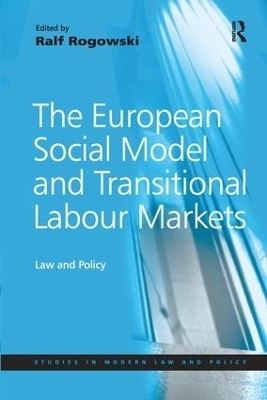
The European Social Model and Transitional Labour Markets
Routledge (Verlag)
9781138277670 (ISBN)
Bringing together theoretical, empirical and comparative perspectives on the European Social Model (ESM) and transitional labour market policy, this volume contains theoretical accounts of the ESM and a discussion of policy implications for European social and employment policies that derive from research on transitional labour markets. It provides an economic as well as legal assessment of the European Employment Strategy and contains evaluations of new forms of governance both in European and member state policies, including discussions of the potential and limits of soft law instruments. Country studies of labour market reforms in Denmark, the Netherlands, Belgium and France assess their contribution to an emerging ESM, while comparative accounts of the ESM examine mobility and security patterns in Europe and beyond and evaluate recent 'flexicurity' policies from a global perspective.
Ralf Rogowski is Reader in Law and Director of the Social Theory Centre at Warwick University. He has written extensively on aspects of European Labour Law.
Contents: Introduction, Ralf Rogowski; Part I Transitional Labour Markets and the European Social Model: The European social model and law and policy of transitional labour markets in the European Union, Ralf Rogowski; Sharing risks: on social risk management and the governance of labour market transitions, Günther Schmid. Part II The European Employment Strategy and Transitional Labour Markets: Research in transitional labour markets: implications for the European employment strategy, Axel van den Berg and Erik de Gier; The European employment strategy, macroeconomic policies, institutional regimes and transitional labour markets, Bernard Gazier and Arnaud Lechevalier; Temporary agency working and the European employment strategy, Patricia Leighton; Employability through covenants: taking external effects seriously, Ton Korver and Peter R.A. Oeij; Social Europe and the limits of soft law: the example of flexicurity, Jean-Claude Barbier. Part III National Transitional Labour Market Policies in Europe: Transitional labour market and flexicurity arrangements in Denmark: what can Europe learn?, Thomas Bredgaard, Flemming Larsen and Per Kongshøj Madsen; Making work pay and social security reform in the Netherlands, G.J.A. Nekkers, W.B Roorda and J.H.L. van der Waart; Making work pay, making transitions flexible: the case of Belgium in a comparative perspective, Lieve de Lathouwer; The Franch basic income (RMI) and transitional markets: one national policy, many local realities, Jacques Bouchoux, Yvette Houzel and Jean-Luc Outin. Part IV Transitional Labour Market Policies in Comparative and International Perspectives: Balancing labour market mobility and employment security across European welfare regimes, Ruud Muffels; Labour market institutions and the European social model in a globalizing world, Peter Auer; Index.
| Erscheinungsdatum | 14.05.2017 |
|---|---|
| Verlagsort | London |
| Sprache | englisch |
| Maße | 156 x 234 mm |
| Gewicht | 453 g |
| Themenwelt | Recht / Steuern ► Allgemeines / Lexika |
| Recht / Steuern ► Arbeits- / Sozialrecht ► Sozialrecht | |
| Recht / Steuern ► EU / Internationales Recht | |
| Sozialwissenschaften ► Politik / Verwaltung ► Staat / Verwaltung | |
| Sozialwissenschaften ► Soziologie ► Spezielle Soziologien | |
| Wirtschaft ► Volkswirtschaftslehre ► Wirtschaftspolitik | |
| ISBN-13 | 9781138277670 / 9781138277670 |
| Zustand | Neuware |
| Informationen gemäß Produktsicherheitsverordnung (GPSR) | |
| Haben Sie eine Frage zum Produkt? |
aus dem Bereich


